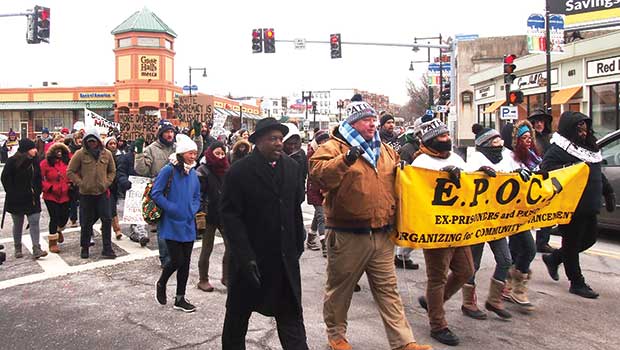Activists march on MLK Day in protest of police brutality
Police shootings are a civil rights issue, they say

Several dozen activists braved the bitter cold on Martin Luther King Jr. Day to march from Grove Hall to Dudley Square in protest of what they call “the new Jim Crow” of our generation.

Leslie Grant and her three children at the Martin Luther King Day march on Monday.

Alfonso Henderson and Brandon Lopez join the march.
Organized by the grassroots campaign Mass Action Against Police Brutality and supported by the Massachusetts chapter of the National African American Caucus of the Service Employees International Union, the rally demanded that the justice system hold police officers accountable for cases of brutality and murder against civilians and reopen past cases of police shootings.
“When police break the law, they should be prosecuted like anybody else. That’s not what’s going on in this country and in Boston,” said Brock Satter, co-organizer for MAAPB.
Another demand: stop mass incarceration and institutionalized racism.
“MLK lost his life in the fight against Jim Crow,” Satter said, “We got a new Jim Crow in America. [For people of color] their cases almost never go to trial, people are forced to plead to crimes they never committed.”
Throughout the march and its subsequent gathering at Dudley Cafe, the stories of victims killed by police, such as Terrence Coleman who was fatally shot by Boston Police in 2016 and Eric Garner who was put in a fatal chokehold by New York City police in 2014, were remembered. Officers in both instances were never indicted.
“We demand that Maura Healey appoint a special prosecutor to reopen [the Terrence Coleman] case,” said Satter, naming the Massachusetts attorney general.
In New York, Governor Andrew Cuomo signed an executive order to appoint the New York Attorney General as a special prosecutor that reviews cases of police brutality.
Wayne Dozier, grandfather of D.J. Henry, shot by NYPD in 2010, and Carla Sheffield, mother of Burrell Ramsey-White, shot by BPD in 2012, also attended the march.
Tahia Bell-Sykes, co-organizer for MAAPB said, “It’s not about what you say, it’s what you do. Therefore, I have no questions about who Trump is. I don’t care what you said in that meeting, I care about your policies and what you do to our people,” she said referring to last week’s news of the president using derogatory remarks to describe El Salvador, Haiti and African countries.
“MLK stood for something, but he acted even more. So our job is to act even more,” said Bell-Sykes. “People are fighting for their lives, it’s not a game … Our lives are constantly being considered ‘less than.’”
At Dudley Cafe, the group spoke via an international call with Siham Byah, a Boston activist who was deported by Immigration and Customs Enforcement and separated from her 8-year-old son.
As she spoke from Morocco, her native country, Byah’s voice rang out throughout the cafe, telling her story of her encounter with a law enforcement official who charged her with assault and battery for speaking up against him, which led to her eventual deportation.
“In 2012, a cop pulled a gun on me because I questioned his authority,” she said.
“This all happened because I had a voice and an opinion. It’s the biggest threat any government can ever face. So please continue to raise your voices everywhere,” she told the listening crowd.
March participant Alfonso Henderson of Brighton said he was there because “Social justice and racial equity is something I value.”
He continued, “We still have a long way to go and this is the start of it … to bring awareness, hold everyone accountable. We can talk about it, but what’s the next step?”
For MAAPB, the next step is to join the “Take the Knee nation” inspired by Colin Kaepernick’s taking the knee during the national anthem in protest of racial inequality, and to continue the movement at this year’s Super Bowl in Minneapolis.
“The Take the Knee movement was one of the bright spots of 2017,” said Satter.






